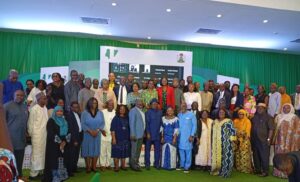Essential Medicines, Essential Lives: Nigeria Charts New Path With Launch Of 8th National List In Abuja

Dr. Nafisat Makinde
Abuja; August 7, 2025
In a determined move to strengthen access to affordable, life-saving drugs, the Federal Ministry of Health and Social Welfare on Wednesday, August 6, 2025, launched the 8th Edition of the Nigeria Essential Medicines List (NEML), alongside the Second Edition of the Nigeria Essential Medicines List for Children (NEMLc).
Held at the Abuja Continental Hotel, the event brought together key government officials, development partners, pharmaceutical stakeholders, and healthcare professionals to witness what many described as a milestone for the nation’s health system. The updated NEML and NEMLc are designed to improve drug availability, affordability, and rational use across all levels of healthcare delivery, ensuring that both adults and children benefit from equitable access to essential medicines.
Representing the Coordinating Minister of Health and Social Welfare, Professor Muhammad Ali Pate, was Dr. Charles Nzelu, Director of Special Projects (South West) at the Ministry. In the Minister’s keynote address, delivered through Dr. Nzelu, he noted that the newly launched lists are not just policy tools but foundational elements of equity in healthcare delivery.
“This is not just a list—it is a tool for equity,” the Minister emphasized. “It reflects our national health priorities and ensures that both adults and children can access the medicines they need to survive and thrive.” He urged all institutions and practitioners to adopt the revised lists as working tools that align with the Basic Health Care Provision Fund (BHCPF) and support the government’s vision for Universal Health Coverage.
The Permanent Secretary of the Federal Ministry of Health, Kachollom S. Daju, mni, also gave remarks emphasizing the inclusiveness and strategic value of the updated editions. She described the process as rigorous, evidence-based, and reflective of Nigeria’s current treatment guidelines, disease burden, and emerging health needs.
“The 8th Edition of the Essential Medicines List and the Second Edition for Children reflect our response to current disease patterns, updated global standards, and national realities,” she said. “They are lifelines—not just for adults but especially for our children.” She charged stakeholders to go beyond ceremonial commitments and ensure full-scale implementation across all sectors of the health system.
Delivering the closing remarks, Pharm. Bunmi Aribeana, Director of Food and Drug Services, who spearheaded the review process, said the lists represent a comprehensive update built on national data, expert recommendations, and World Health Organization (WHO) guidance. She acknowledged the dedication of the various technical working groups, clinicians, pharmacists, procurement experts, and development partners who contributed to the final documents.
“The inclusion of the Essential Medicines List for Children ensures that our youngest population is not left behind,” she stated. “This list responds to emerging health needs, especially in child health, maternal care, non-communicable diseases, and emergencies.” She added that the Ministry is committed to periodic reviews to ensure the list remains relevant, evidence-based, and reflective of local realities.
Development partners present at the event commended the Federal Government for its leadership. WHO Country Representative to Nigeria, Dr. Walter Kazadi Mulombo, praised the country’s efforts to improve access to safe and effective medicines for all Nigerians.
“Access to safe, effective, and affordable medicines is a human right,” he said. “We commend Nigeria for ensuring that children are part of this national priority through the updated NEMLc.” Similar goodwill messages were delivered by representatives of UNICEF, USAID-MTAPS, RTSL, USEP, MPAPS, CHAI, NCDC, NHIA, NMA, PSN, PFNP, PCN, NAFDAC, and other professional health institutions. They pledged support for continuous review, production, and implementation of the lists to promote rational medicine use and availability.
Stakeholders agreed that both the NEML and NEMLc are not just documents but living tools. They are expected to guide procurement planning, rational prescribing, healthcare worker training, budgeting, health insurance reimbursements, and public health policy at all levels. With proper adoption and consistent implementation, the lists are expected to significantly improve Nigeria’s health indices and advance the nation’s journey toward accessible, affordable, and equitable healthcare for all citizens—young and old alike.

